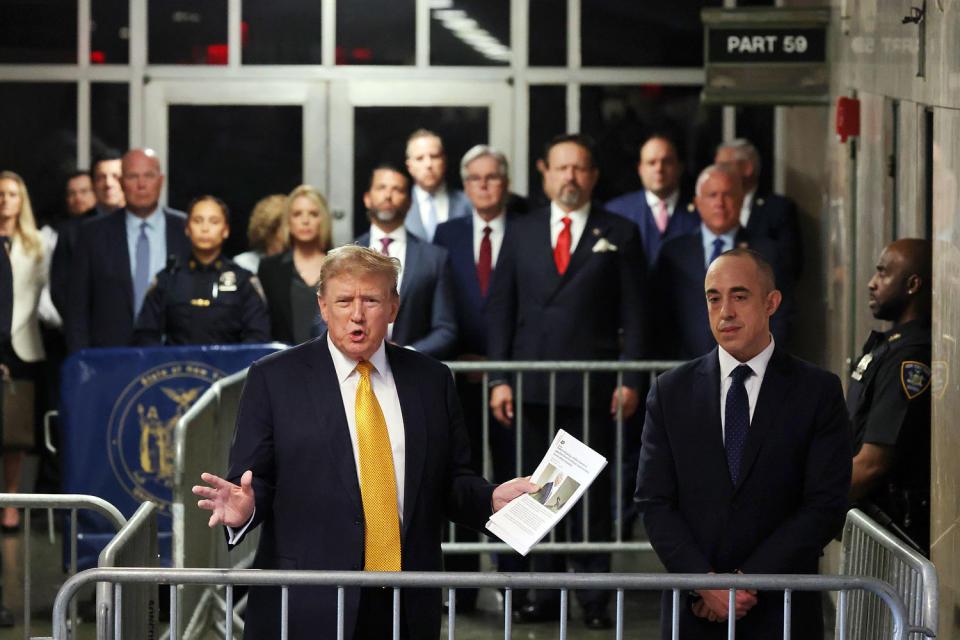Trump won't testify and emails remain the credibility crunch. What you missed on Day 20 of the hush money trial.
- Oops!Something went wrong.Please try again later.
- Oops!Something went wrong.Please try again later.
Over the course of just a few hours in court, Donald Trump's legal team presented its entire case: Don't believe Michael Cohen.
After presenting two witnesses, including one who was a staff member tasked with explaining a spreadsheet, the defense formally rested its case on Tuesday morning.

The defense's key witness, Robert Costello, returned to the stand Tuesday morning and quickly came under fire for how he had characterized his relationship with Cohen, as prosecutors again and again used his own words against him.
Prosecutor Susan Hoffinger twisted the knife, referring to Costello’s comments Monday that an email spoke for itself as she presented him with emails and records disputing his characterizations.
Moments later, the defense rested its case.
Here’s what you missed on Day 20 of Trump’s hush money trial:
Trump will not testify
Over 16 days of testimony, 22 witnesses took the stand — but despite saying several times he wanted to be among them, Trump ultimately did not testify in his own defense.
Trump has spoken at least once a day outside the courtroom to cameras set up by the media. At the beginning of the trial, he suggested that he was going to testify, but then his tone shifted.
It was long viewed as unlikely by legal experts, who noted that Trump would be exposing himself to an intense cross-examination if he took the stand.
Costello's credibility under fire
Without Trump, the defense case largely rests on persuading the jury not to believe Cohen. To do that, Costello was its key witness, but he, too, faced challenges to his credibility.
Costello quibbled with Hoffinger about details, denying comments that the prosecution then showed in an email, a dynamic that led him to appeal for context. “The email speaks for itself, sir?” Hoffinger asked at one point — echoing the same phrase Costello had used when asked about an email on direct examination. Costello pushed back, saying: “Not quite; it depends on surrounding circumstances.”
After Costello denied mentioning his close friendship with Rudy Giuliani during his initial meeting with Cohen, which Cohen says he believed was an effort to pressure him into silence, Hoffinger showed an email in which Costello told his business partner that he had advised Cohen that he could prove useful to him because of his ties to Giuliani.
In an email, Costello told Cohen to “sleep well tonight, you have friends in high places,” referring to Trump, he conceded.
In another, Costello wrote about the need to get “Cohen on the right page without giving him the appearance that we are following instructions from Giuliani or the president. In my opinion, this is the clear and correct strategy.”
After Costello said it was incorrect to claim that he thought Cohen was trying to manipulate Trump, Hoffinger showed an email from the lawyer to his business partner, saying, "what should i say to this a------, he is playing with the most powerful man on the planet.”
What's next?
The two sides spent Tuesday afternoon hashing out jury instructions with the judge, in what’s known as a jury conference.
Jurors will not return until next Tuesday, when summations in the case will begin, lending Judge Juan Merchan’s preliminary instructions to the jurors — not to read or listen to any transcripts of or commentary on the trial — added significance.
“Do not attempt to research any fact,” Merchan said. He expects closing arguments to last into next Wednesday, followed by instructions to the jury.
Deliberations are expected to start next Wednesday.
This article was originally published on NBCNews.com

